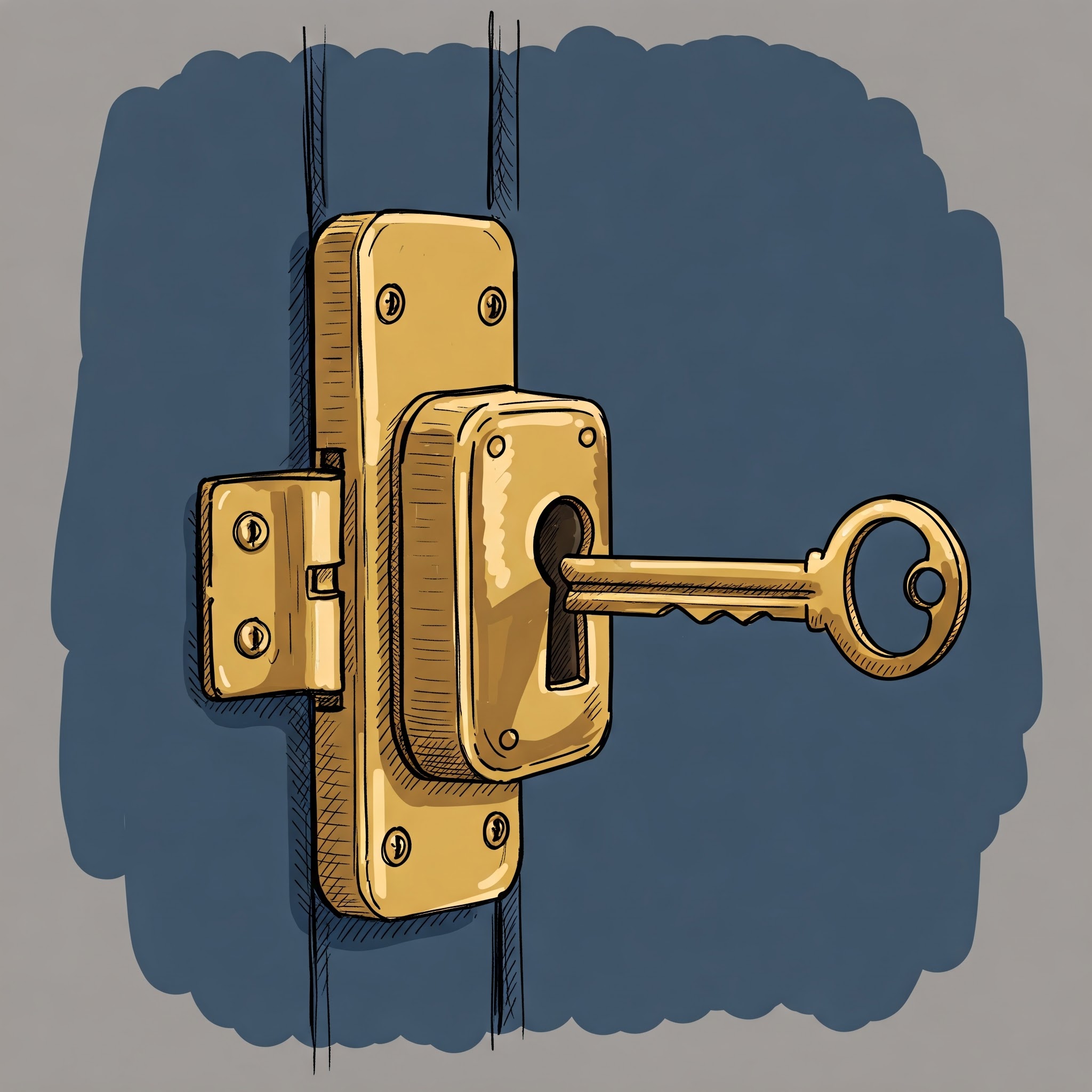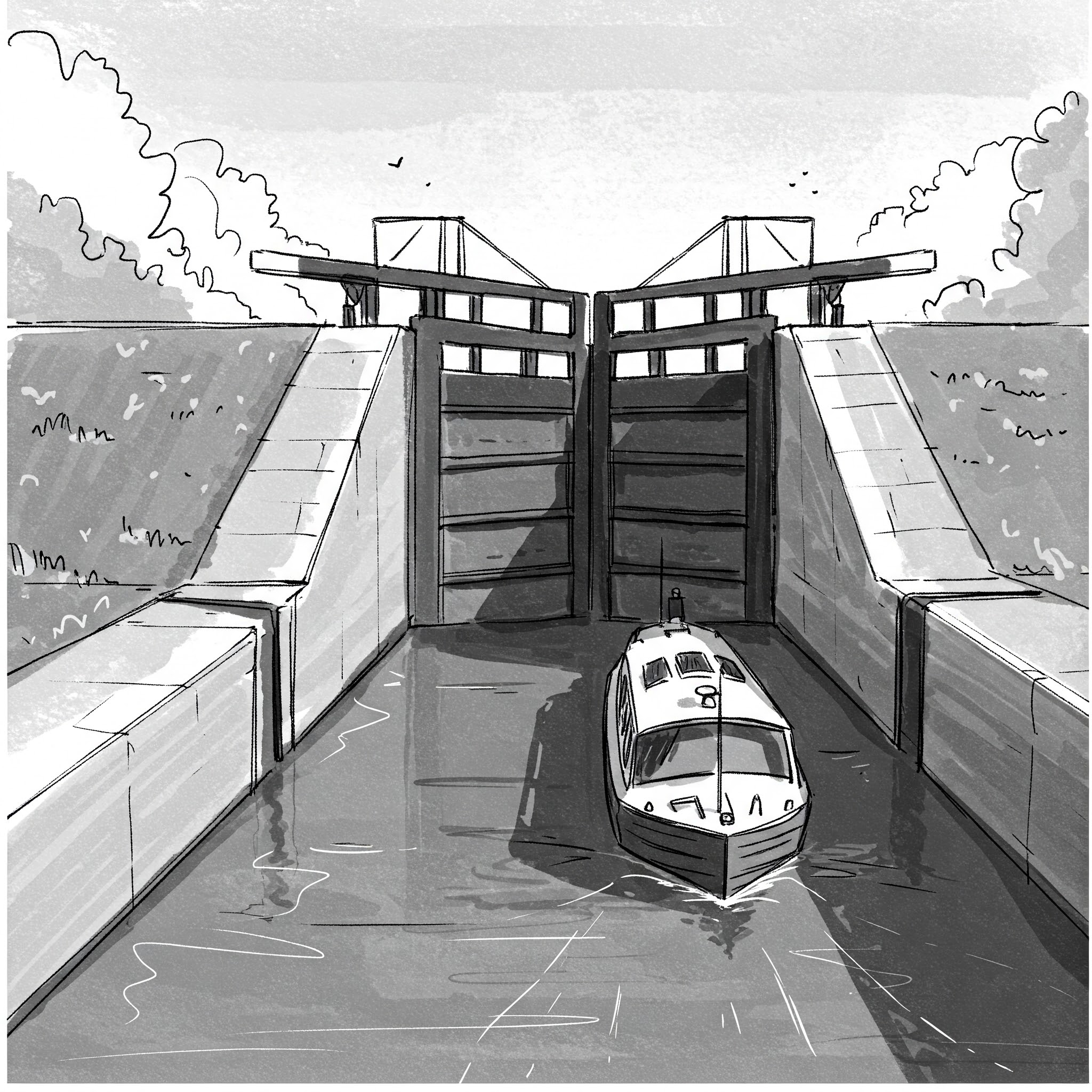Lock
Definition
Lock is a noun and a verb. As a noun, it refers to a device used for securing something to prevent unauthorized access or movement, or a section of hair. As a verb, it means to secure something with a lock or to become fixed or immovable.
Parts of Speech
- Noun
- Verb
Pronunciation
American English
- IPA Pronunciation: /lɑːk/
- Respelling: LAHK
British English
- IPA Pronunciation: /lɒk/
- Respelling: LOK
Etymology
The word "lock" originates from Old English "loc," meaning "fastening, enclosure, or bolt," and is derived from Proto-Germanic "*lukan," meaning "to close." Its modern usage in English developed during the early medieval period.
Derivatives
- Locked (adjective)
- Lockable (adjective)
- Unlock (verb)
- Locksmith (noun)
- Lockdown (noun)
Synonyms
- Fasten
- Secure
- Latch
Antonyms
- Unlock
- Open
- Release
Usage
The term "lock" is used in contexts involving security, mechanics, and even personal grooming. For example, "She secured the door with a lock," or "He has a lock of curly hair."
Related Terms
- Key: A device used to operate a lock.
- Bolt: A sliding bar mechanism for fastening doors.
- Seal: A device or material used to close or secure something.
Detailed Definitions
Noun
- A device used to secure or fasten something: Refers to mechanical devices that prevent access.
- Example: "The door was fitted with a sturdy lock."
- A section of hair: Refers to a piece or strand of hair.
- Example: "She kept a lock of her child's hair as a keepsake."
- A device for controlling water levels in canals: Refers to a mechanism in waterways for raising or lowering boats.
- Example: "The boat passed through the canal lock smoothly."
Verb
- To secure with a lock: Describes the act of fastening or securing something.
- Example: "He locked the door before leaving."
- To become fixed or immovable: Refers to a mechanism or situation becoming unable to move.
- Example: "The gears locked into place."
lock



🇨🇳 Mandarin
- 锁 (suǒ) - mechanism for fastening
- IPA Pronunciation: /su̯ɔ˧˥/
- Respelling in English: swo
- 锁定 (suǒdìng) - act of locking
- IPA Pronunciation: /su̯ɔ˧˥tiŋ˥˩/
- Respelling in English: swo-ding
🇮🇳 Hindi
- ताला (tālā) - mechanism for fastening
- IPA Pronunciation: /t̪aːlaː/
- Respelling in English: tah-lah
- बंद करना (band karnā) - act of locking
- IPA Pronunciation: /bənd kərˈnaː/
- Respelling in English: band kar-na
🇪🇸 Spanish
- Cerradura (cerradura) - mechanism for fastening
- IPA Pronunciation: /θe.raˈðu.ra/
- Respelling in English: the-ra-doo-ra
- Bloquear (bloquear) - act of locking
- IPA Pronunciation: /blo.keˈar/
- Respelling in English: blo-ke-ar
🇫🇷 French
- Serrure (serrure) - mechanism for fastening
- IPA Pronunciation: /sɛ.ʁyʁ/
- Respelling in English: se-ryur
- Verrouiller (verrouiller) - act of locking
- IPA Pronunciation: /vɛ.ʁu.je/
- Respelling in English: ve-roo-ye
🇸🇦 Modern Standard Arabic
- قفل (qifl) - mechanism for fastening
- IPA Pronunciation: /qɪfl/
- Respelling in English: qifl
- قفل (qifl) - act of locking
- IPA Pronunciation: /qɪfl/
- Respelling in English: qifl
🇧🇩 Bengali
- তালা (tālā) - mechanism for fastening
- IPA Pronunciation: /t̪ala/
- Respelling in English: tah-lah
- লক করা (lok kôra) - act of locking
- IPA Pronunciation: /lok kɔra/
- Respelling in English: lok kor-a
🇷🇺 Russian
- Замок (zamok) - mechanism for fastening
- IPA Pronunciation: /ˈzamək/
- Respelling in English: za-mok
- Блокировка (blokirovka) - act of locking
- IPA Pronunciation: /bləkʲɪˈrofkə/
- Respelling in English: blo-kee-rov-ka
🇵🇹 Portuguese
- Fechadura (fechadura) - mechanism for fastening
- IPA Pronunciation: /fɨʃɐˈdurɐ/
- Respelling in English: fe-sha-doo-ra
- Travar (travar) - act of locking
- IPA Pronunciation: /tɾɐˈvaɾ/
- Respelling in English: tra-var
🇮🇩 Indonesian
- Kunci (kunci) - mechanism for fastening
- IPA Pronunciation: /kunt͡ʃi/
- Respelling in English: kun-chee
- Mengunci (mengunci) - act of locking
- IPA Pronunciation: /məŋʊnt͡ʃi/
- Respelling in English: me-ngun-chee
🇩🇪 German
- Schloss (Schloss) - mechanism for fastening
- IPA Pronunciation: /ʃlɔs/
- Respelling in English: shlos
- Sperren (sperren) - act of locking
- IPA Pronunciation: /ˈʃpɛrən/
- Respelling in English: shper-en
🇯🇵 Japanese
- 錠 (jou) - mechanism for fastening
- IPA Pronunciation: /dʑoː/
- Respelling in English: jo
- 錠をかける (jou o kakeru) - act of locking
- IPA Pronunciation: /dʑoː o kakɛɾɯ/
- Respelling in English: jo o ka-ke-ru
🇻🇳 Vietnamese
- Khóa (khóa) - mechanism for fastening
- IPA Pronunciation: /kʰwaː˧˦/
- Respelling in English: khwa
- Khóa (khóa) - act of locking
- IPA Pronunciation: /kʰwaː˧˦/
- Respelling in English: khwa
🇰🇷 Korean
- 자물쇠 (jamulsoe) - mechanism for fastening
- IPA Pronunciation: /t͡ɕa.mul̥.sw̥e/
- Respelling in English: cha-mul-swe
- 잠그다 (jamgeuda) - act of locking
- IPA Pronunciation: /t͡ɕam.kɯ.da/
- Respelling in English: jam-geu-da
🇹🇷 Turkish
- Kilit (kilit) - mechanism for fastening
- IPA Pronunciation: /kilit/
- Respelling in English: kee-leet
- Kilitlemek (kilitlemek) - act of locking
- IPA Pronunciation: /kilitlɛmɛk/
- Respelling in English: kee-leet-le-mek
🇵🇰 Urdu
- تالہ (tālā) - mechanism for fastening
- IPA Pronunciation: /t̪aːlaː/
- Respelling in English: tah-lah
- تالہ لگانا (tālā laganā) - act of locking
- IPA Pronunciation: /t̪aːlaː ləɡaːnaː/
- Respelling in English: tah-lah la-ga-na
a





